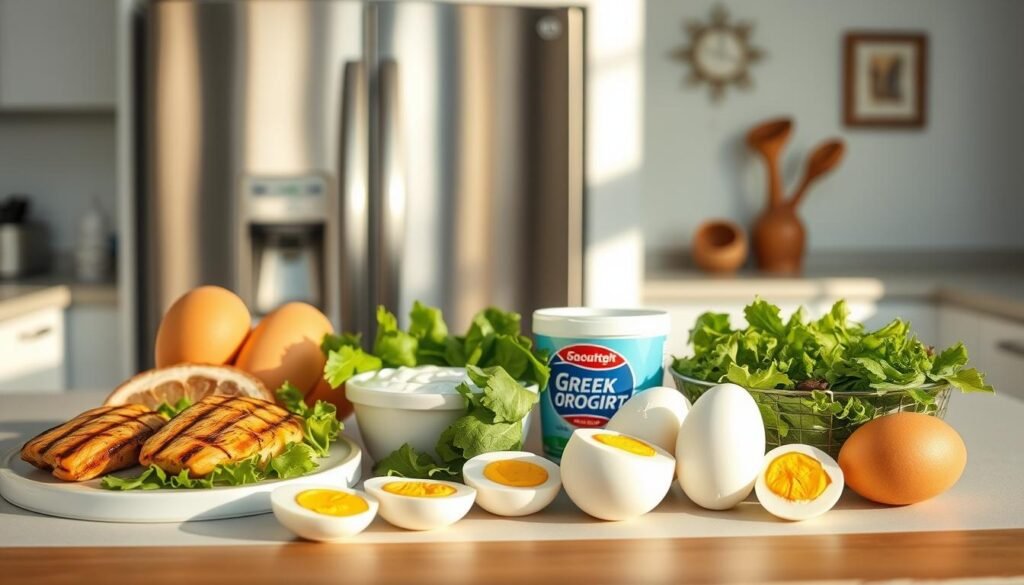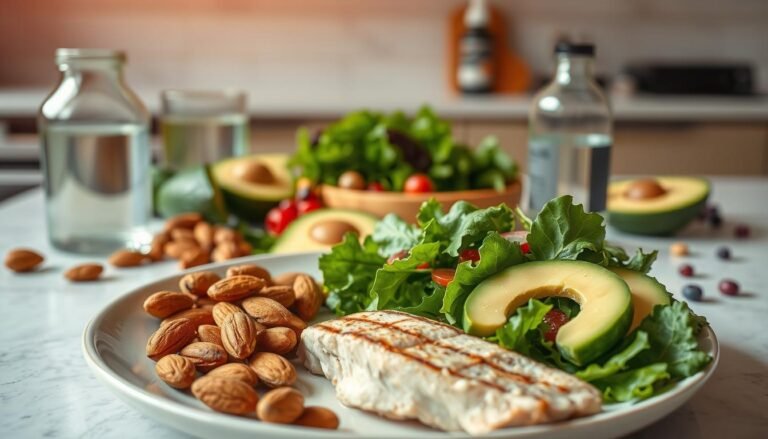Struggling to manage hunger and boost metabolism? You’re not alone. A high protein diet can change the game for your goals.
The Dietary Guidelines for Americans 2020–2025 suggest at least 56 grams of protein daily for adult males and 46 grams for females. More protein makes you feel fuller and boosts your metabolism. This helps with weight loss.
Adopting this diet brings big benefits for a healthier, more lasting path to your goals. It helps manage hunger and boosts metabolism.
The Science Behind High Protein Diets and Weight Loss
High protein diets and weight loss are linked through several metabolic processes. Eating a diet high in protein triggers responses that help with weight loss.
How Protein Affects Your Metabolism
Protein greatly impacts your metabolism, affecting your BMR and RMR. A 2018 review found that higher protein intake may boost your BMR and RMR. This means your body burns more calories at rest.
The Thermic Effect of Protein
Protein’s high thermic effect is a key metabolic influence. Your body uses more energy to digest and process protein than carbs or fats. So, a high protein diet can increase your energy use, aiding in weight loss.
Protein’s Impact on Hormones
Protein also affects hormones that control hunger and fullness. Increased protein intake has been shown to boost the production of hormones like PYY and GLP-1. These hormones help you feel full and satisfied, reducing the chance of overeating.
Protein’s Role in Muscle Preservation During Weight Loss
When you lose weight, you’re not just losing fat. You also risk losing muscle mass. This is where protein’s role is crucial.
Preventing Muscle Catabolism
Adequate protein intake is key to keeping muscle mass during weight loss. By eating enough protein, you can prevent muscle breakdown. This ensures you lose mostly fat, not muscle.
Understanding the science behind high protein diets and weight loss helps you make better dietary choices. This maximizes your chances of success.
Benefits of a Weight Loss High Protein Diet
Starting a weight loss high protein diet can change your life if you’re overweight. This diet has many benefits that can help you lose weight.
Increased Satiety and Reduced Hunger
One big plus of a high protein diet is it makes you feel full longer. This is because protein takes longer to digest than carbs. You eat fewer calories because you don’t snack as much.
How Protein Suppresses Appetite Hormones
Protein also helps control hunger. It lowers hunger hormones and boosts fullness hormones. This balance helps you eat less and feel fuller.
Enhanced Calorie Burning Through Thermogenesis
A high protein diet boosts your metabolism. It takes more energy to digest protein than carbs or fats. This means you burn more calories, helping you lose weight.
Improved Body Composition
This diet not only helps you lose weight but also improves how your body looks. You keep your muscle mass while losing fat, making you look toned and healthy.
Building Lean Muscle While Losing Fat
With exercise, a high protein diet helps build lean muscle. Having more muscle means you burn more calories even when you’re not moving. This helps you lose and keep off weight.
Adding the best high protein foods for weight loss to your meals can really help. Choose lean meats, fish, eggs, dairy, and plant-based foods like legumes and tofu. By making smart food choices, you’re on your way to reaching your weight loss goals.
How Much Protein Do You Need for Weight Loss?
The amount of protein you need for weight loss varies. It depends on your body weight and how active you are. Knowing your protein needs is key to a successful weight loss diet.
Calculating Your Personal Protein Requirements
To figure out your protein needs, start with your body weight. The Recommended Dietary Allowance (RDA) is 0.8 grams of protein per kilogram of body weight (g/kg/bw) for adults. But, research shows eating more protein than the RDA can help with weight loss.
Protein Needs Based on Body Weight
Studies found that eating 1.34 g/kg/bw of protein can lead to more weight loss. Here’s a simple table to help you estimate your protein needs based on body weight:
| Body Weight (kg) | RDA Protein Intake (g) | High Protein Intake for Weight Loss (g) |
|---|---|---|
| 60 | 48 | 80.4 |
| 70 | 56 | 93.8 |
| 80 | 64 | 107.2 |
Adjusting Protein Intake Based on Activity Level
Your activity level affects your protein needs. Athletes or those who are very active need more protein for muscle repair and growth.
Special Considerations for Athletes
Athletes might need 1.2 to 2.2 g/kg/bw of protein, based on their training intensity and frequency. It’s important for muscle preservation and recovery during intense physical activity.
By adjusting your protein intake based on your body weight and activity level, you can improve your weight loss. A balanced diet with the right amount of protein can help you lose weight more effectively.
Best High Protein Foods for Weight Loss
To lose weight on a high protein diet, focus on foods rich in nutrients. Include a variety of protein-rich foods in your diet. These foods help with weight loss and improve overall health.
Lean Animal Protein Sources
Lean animal proteins are great for weight loss. They have lots of protein and fewer calories. These proteins help build and repair muscles, which is key when losing weight.
Poultry and Fish Options
Poultry and fish are top choices for lean protein. Chicken breast and turkey breast are high in protein and low in fat. Salmon and tuna are rich in protein and omega-3 fatty acids, good for the heart.
Dairy Protein Sources
Dairy products are lean animal proteins. Greek yogurt and cottage cheese are high in protein and filling. They’re perfect for weight loss diets.
Plant-Based Protein Options
Plant-based diets have many high protein foods for weight loss. Legumes, beans, nuts, and seeds are good options.
Legumes and Beans
Legumes and beans are rich in protein and fiber. They’re very filling. Examples include lentils, chickpeas, and black beans.
Nuts, Seeds, and Plant Protein Products
Nuts and seeds like almonds and chia seeds are good protein sources. Plant protein products like tofu and tempeh can also boost protein intake.
Protein-Rich Foods with Additional Health Benefits
Some protein-rich foods have extra health benefits. Fatty fish are rich in omega-3 fatty acids. Eggs are a good source of vitamins and minerals.
| Protein Source | Protein Content per Serving | Additional Benefits |
|---|---|---|
| Chicken Breast | 31g per 3 oz serving | Low in fat, rich in B vitamins |
| Salmon | 20g per 3 oz serving | Rich in omega-3 fatty acids |
| Lentils | 18g per 1 cup cooked | High in fiber, rich in minerals |
Creating a Weight Loss Meal Plan with High Protein
A well-structured weight loss meal plan with high protein can help a lot. It boosts your metabolism and helps you reach your goals faster.
Balanced Meal Structure
Having a balanced meal is key for a high protein diet. You need to find the right protein-carb-fat ratios for your meals.
Protein-Carb-Fat Ratios
Try to have a lot of protein in your meals. Aim for 40% of your calories to come from protein. The rest should be carbs and fats, but this can change based on your needs and how active you are.
Sample 7-Day High Protein Meal Plan
Here’s a simple meal plan to start with:
- Breakfast: Eggs with spinach and avocado
- Lunch: Grilled chicken breast with quinoa and vegetables
- Dinner: Baked salmon with sweet potato and green beans
- Snacks: Greek yogurt with berries, protein smoothie
Grocery Shopping List
To follow this meal plan, you’ll need to buy certain foods. Make sure to get:
- Lean meats: chicken breast, turkey breast
- Fish: salmon, tilapia
- Eggs and dairy: eggs, Greek yogurt
- Plant-based proteins: tofu, tempeh
Meal Prep Strategies
Good meal prep is essential for a high protein diet. Cook in bulk, portion meals, and use a slow cooker to make things easier.
By using this structured plan, you can make a weight loss meal plan with high protein. It will fit your needs and help you reach your weight loss goals.
Timing Your Protein Intake for Maximum Weight Loss
Getting your protein intake right is key for losing weight on a high protein diet. Eating protein all day helps keep you full and supports muscle health. These are important for reaching your weight loss goals.
Protein Distribution Throughout the Day
Eating protein at every meal helps you stay full and keeps your muscles strong. Try to add protein to each meal to feel more satisfied.
The Importance of Breakfast Protein
Eating a protein-rich breakfast boosts your metabolism and controls hunger in the morning. Start with eggs, Greek yogurt, or a protein smoothie for a great breakfast.
Pre and Post-Workout Protein Strategies
Protein before and after workouts makes your exercise better. Pre-workout protein fuels your muscles. Post-workout protein helps with recovery and growth.
Protein Before Bed: Helpful or Harmful?
Protein before bed helps with muscle recovery while you sleep. But, choose slow-digesting proteins like casein for better muscle repair at night.

Combining High Protein Diet with Exercise for Optimal Results
Pairing a high protein diet with regular exercise can greatly improve weight loss and health. This combination boosts your body’s ability to lose fat and build lean muscle.
Strength Training and Protein Synergy
Strength training is key for effective weight loss. When paired with a high protein diet, it leads to significant muscle gains and strength. Protein is vital for repairing and building muscle, making it crucial for athletes and those who regularly train.
Building Muscle While Losing Fat
Strength training requires enough protein to grow and repair muscles. Eating enough protein helps build muscle while losing fat, leading to a leaner body. Choose lean protein sources like chicken, fish, and turkey to support your strength training.
Cardio Exercise Considerations
Strength training is important for muscle building, but cardio is key for burning calories and improving heart health. When doing cardio with a high protein diet, remember to meet your protein needs for endurance activities.
Protein Needs for Endurance Activities
For those who do cardio like running or cycling, enough protein is crucial for muscle recovery. Try to eat protein-rich foods or supplements within 30-60 minutes after working out. This helps with muscle recovery and boosts performance.
By combining a high protein diet with regular exercise, you can see significant weight loss success and better health. Focus on best high protein foods for weight loss like lean meats, fish, eggs, and plant-based options to reach your fitness goals.
Common Mistakes to Avoid on a High Protein Diet
A well-planned high protein diet is key to successful weight loss. But, what are the common mistakes to avoid? When following a high protein diet for weight loss, it’s essential to be mindful of several factors. This ensures you’re getting the most out of your dietary efforts.
Neglecting Other Nutrients
One of the most significant mistakes is neglecting other essential nutrients. While protein is crucial, a balanced diet that includes a variety of foods is vital for overall health.
Balancing Protein with Fiber and Micronutrients
To avoid nutrient deficiencies, make sure to balance your protein intake with:
- Fiber-rich foods like vegetables, fruits, and whole grains
- Micronutrients from sources like nuts, seeds, and leafy greens
Relying Too Heavily on Supplements
Another common mistake is relying too heavily on protein supplements. While they can be convenient, whole foods should be your primary source of protein.
When Protein Supplements Make Sense
Protein supplements can be useful in certain situations, such as:
- Post-workout recovery
- When you’re struggling to meet your protein needs through whole foods
Overlooking Hidden Calories
It’s also important not to overlook hidden calories in your diet. Many high protein foods and supplements can be high in calories.

By being aware of these common mistakes, you can optimize your weight loss high protein diet. This way, you can achieve your goals more effectively.
Potential Concerns and Side Effects
A high protein diet can help with weight loss, but it’s important to know the possible side effects. When thinking about a high protein diet for fast weight loss, knowing these issues can help you decide wisely.
Impact on Kidney Function
High protein diets might strain the kidneys. People with kidney problems should talk to their doctor first.
Who Should Monitor Protein Intake
If you have kidney disease, watch your protein intake closely. Your doctor can tell you how much is safe.
Digestive Considerations
Some may face digestive problems with high protein diets. Issues like constipation, diarrhea, and stomach cramps can occur.
Managing Gas and Bloating
To reduce gas and bloating, eat more fiber and drink water. Also, try different protein sources to see what works for you.
Managing Potential Side Effects
To avoid side effects, balance your high protein diet with other foods. Make sure you get enough vitamins and minerals.
Knowing these concerns and managing them can help you enjoy the benefits of a high protein diet for weight loss without the downsides.
Success Stories: Real Results from High Protein Diet Weight Loss
Many people have seen great results with a high protein diet for weight loss. They’ve lost weight and improved their health by eating more protein.
Transformation Examples
Sarah, a 35-year-old mom, lost 25 pounds in three months. She followed a high protein meal plan and ate about 120 grams of protein daily. This helped her build muscle and increase her metabolism.
Before and After Scenarios
| Person | Before | After | Weight Loss |
|---|---|---|---|
| Sarah | 180 lbs | 155 lbs | 25 lbs |
| John | 220 lbs | 190 lbs | 30 lbs |
Lessons Learned from Successful Dieters
Successful dieters often share common traits. They are consistent and patient. They also stress the need for a balanced diet with various high protein foods and regular exercise.
Sustainable Habits for Long-Term Success
To keep losing weight over time, it’s important to adopt lasting habits. This includes meal planning, tracking protein, and staying hydrated. Planning your meals in advance helps you stay on track and avoid unhealthy choices.

Conclusion
A well-planned high protein diet can help you lose weight. It works by boosting your metabolism. Adding high-quality protein to your meals can help you reach your weight loss goals.
To get the most out of a high protein diet, eat well and exercise regularly. This combo not only helps you lose weight but also improves your health.
Choose lean meats, plant-based proteins, and focus on your nutrient balance. This way, you can make a high protein diet that fits your life and tastes.
Remember, timing your protein intake and avoiding common mistakes are key. Knowing about potential issues can also help. With a good high protein diet plan, you can become a healthier version of yourself.


